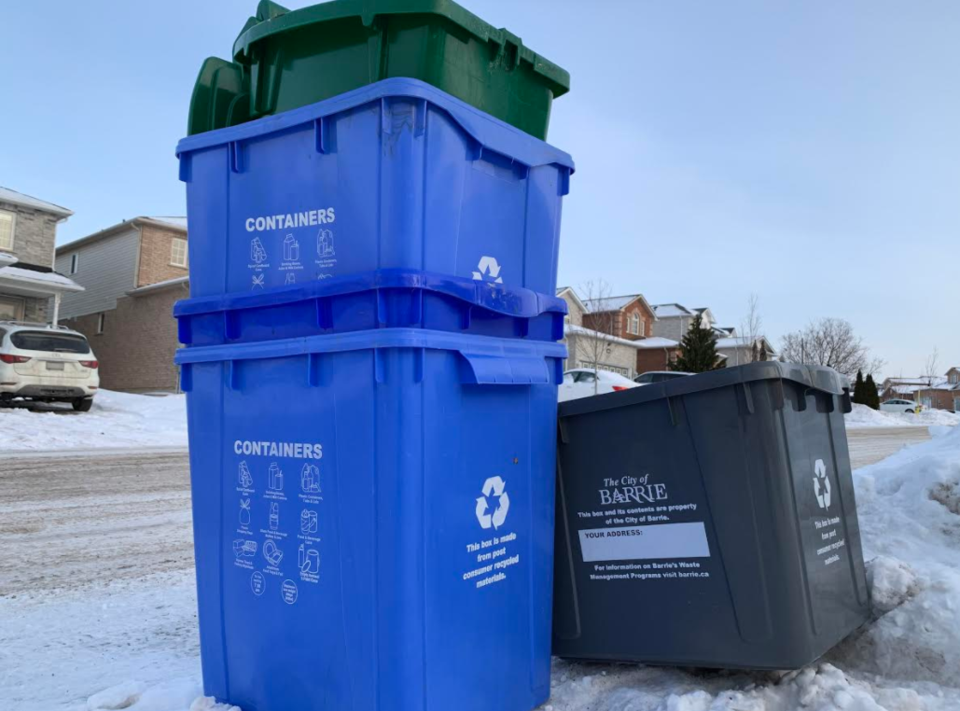More cost and less service could be the bottom line when Barrie’s recycling program becomes producers' responsibility in the not-so-distant future.
“Frankly, if this is the deal we wouldn’t have agreed to it as AMO,” Mayor Jeff Lehman said of the Association of Municipalities of Ontario. “I’m quite concerned that as this is rolled out, it must have been a frog in boiling water, if you will pardon the expression, where changes have eroded the benefits our sector has so long fought for, because this isn’t the circular economy, this is downloading.
“Why are we taking on additional costs when this was supposed to be a substantial savings to all municipalities?”
At this week's building committee meeting, city councillors also heard that Blue and Grey Boxes could only be picked up once every two weeks, as opposed to the weekly city service now offered, when recyclables become producers’ responsibility.
“I’m kind of shocked at the reduction in service, the potential for actually not saving taxpayers’ money, that’s kind of, to me, what some of the biggest goals for producer responsibility were,” Coun. Keenan Aylwin said. “So that’s shocking to me, to be honest.”
In June, the province decided to transition the responsibility of Blue Box programs from municipalities to producers — the companies which make the glass, metal and plastic containers, etc. Producers will be fully accountable and financially responsible for Blue Box programs for designated, eligible sources. Municipalities will no longer be obligated to deliver Blue Box-related services for these same eligible sources.
“The producers are responsible for collection, processing, customer service and bin provision,” said Sandra Brunet, the city’s manager of business performance and environmental sustainability.
Producers have until July 2022 to fully define their programs and processes. Barrie previously chose May 1, 2024 as a transition date, to align with the current waste collection contract’s end date. Municipalities will continue to be responsible for the collection of garbage, organics, yard waste and the recyclables producers are not collecting, which are still to be determined.
Brunet said it’s unclear at this point if the new program will cost Barrie more or less money, or how much. The existing 50 per cent in provincial funding will cease in 2024. In 2020, that funding was approximately $1.4 million.
She also said it’s unclear if the city will be able to influence producers — or their delivery agents — on service levels.
“What we don’t know probably exceeds what we know today,” said Michael Prowse, the city’s chief administrative officer.
Building committee made no decisions on the information it received at the Sept. 21 meeting, just to send members’ questions to Brunet and schedule more time to discuss the matter at a future meeting.
“At the time it was announced, it was announced as an enormous savings to municipalities, so if in the rollout of the details, savings have become costs and service levels have changed, and both of those were key to our sectors’ agreement with government, so something has changed quite substantially between now… and what had been announced just a few months ago,” Lehman said.
“Certainly our residents will see it as a service reduction,” he added. “They will have to store more Blue and Grey Box materials for much longer. That means we’re going to own twice as many bins. We’re going to have a lot of complaints from people in small housing units, just at the time when the city is moving to build a lot more apartments.”
Lehman mentioned that this plan doesn’t further a circular economy, but instead it’s the provincial government downloading costs to municipalities.
A circular economy calls for a change in mindset. You buy only what’s needed, while repairing and refurbishing to extend a product’s life span. Durable products should be shared with friends and family, and consumable products should be used in their entirety.
This transfer of recycling responsibility from Ontario municipalities to producers will be a three-year process, from July 1, 2023 to Dec. 31, 2025. Roughly one-third of Ontario municipalities will make the transition each year.



